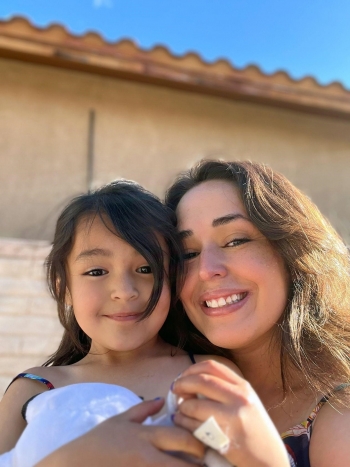
Editor’s note: This story is part of a series of profiles of notable fall 2023 graduates.
Magen Martinez, who earned his master’s degree in biomedical diagnostics, is also the full-time director of laboratory operations at Tricor Reference Laboratories in New Mexico.
College of Health Solutions graduate Magen Martinez (right) with her daughter, Diana. Photo courtesy Magne Martinez
Download the full image
But before those two things, she is a single mother to her daughter Diana, who she says has helped her She is thriving in pursuing her higher education.
Teaching assistant professor Michael Donovan He described Martinez as “quite simply the most impressive orthopedic engineering student I have ever had the pleasure of teaching during my time at ASU.”
When talking about her daughter, Martinez said, “She and I are a team, and I want to showcase that to her and the world whenever possible.”
Diana was Martinez’s main motivation for pursuing her master’s degree.
With a bachelor’s degree in applied mathematics and chemistry, Martinez wanted to get a master’s degree to match her current job. Arizona State University Online provided the right program at the right time.
Martinez said ASU Online contributed to her success because, with her busy schedule, she didn’t have time to travel to campus for in-person classes.
“I had to devote a lot of time to it,” Martinez said. “But it didn’t stop me from going to work every day, and it didn’t stop me from being a mother and raising my daughter and taking care of her, so that was really nice.”
Below, Martinez details her time with ASU and her plans after graduation.
Question: What was your “aha” moment when you realized you wanted to study the field you majored in?
Answer: I knew I wanted to do a master’s degree because I felt that having a master’s degree was really important when you look at the research and development side of things.
Q: Why did you choose ASU?
a: I really wanted to get a master’s degree, so when I found this degree online, it was kind of perfect because it’s what I do, work in a clinical laboratory. I specialize in developing assays, introducing new tests, and creating laboratory tests.
Q: What is something you learned while at ASU—in the classroom or otherwise—that surprised you or changed your perspective?
a: Medical ethics, information ethics, how to share it and how to use it. I don’t know that it changed my mind, but it opened my mind to these mysteries that I don’t think I’d thought about before — things like genetic testing and what the pros and cons of that are. How it can be something that can be abused and how it can be a life-changing thing. How can we be stewards of that information and medications to make sure they do what they need to do?
s: Who is the professor who taught you the most important lesson while at ASU?
a: It was definitely Dr. Donovan. (He taught me) to believe in myself and to trust in the work I do, to be recognized as hard work, and to never stop pushing.
s: What is your best advice for those still in school?
a: My biggest advice is to never give up, and believe in yourself. I didn’t do well in college because I didn’t focus on school the way I should have. My GPA was very low. In fact, it was only because of excellent references and real-world experience that I was able to get into the graduate program. I was placed as a probationary admission for the first year. I promised myself that I would do better this time, and it was definitely hard to keep that promise at times. I never stopped trying, because I knew I could do it if I put my mind and heart into it.
s: What is your favorite place to study strength?
a: On the couch, under a blanket, with “Hamilton” playing in the background.
s: What are your plans after graduation?
a: Work in the laboratory and keep moving forward in this direction.
s: If someone gave you $40 million to solve one problem on our planet, what would you solve?
a: Ways for people from different cultures to communicate with each other and actually understand each other. I think this is where most of our problems come from. We have different languages and different cultures. If there was a way to create software so we could understand each other better, I think the world would be a much better place
Story by Aidan Hansen, communications assistant, College of Health Solutions

